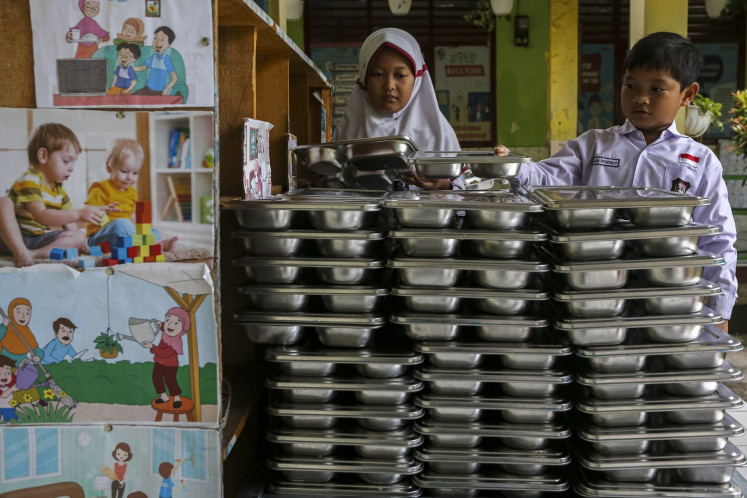Indonesia's global maritime quest sans the Indian Ocean
Since October 2015, Indonesia has been chair of the Indian Ocean Rim Association (IORA), a regional institution comprising coastal states bordering the Indian Ocean
Change text size
Gift Premium Articles
to Anyone

S
ince October 2015, Indonesia has been chair of the Indian Ocean Rim Association (IORA), a regional institution comprising coastal states bordering the Indian Ocean.
The IORA should be seen, and treated accordingly, as a modality for Indonesia's diplomacy in the Indian Ocean in its attempt to become a global maritime power. Indonesia should balance out its activism in the Pacific with a more diplomatic thrust in the Indian Ocean, backed up by a robust military presence and readiness.
Our new foreign policy doctrine is built upon the renewed realization of Indonesia's geographical destiny to possess a strong maritime industry ' residing as it does between the Indian and Pacific oceans.
The activism, however, is so far uneven with the Pacific Ocean receiving more attention and the Indian Ocean remaining largely underdeveloped in terms of diplomacy and the ascription of strategic weight.
On the Pacific front, for example, there are already a number of multilateral diplomatic forums in place.
The closer attention Indonesia pays to the Pacific is also reflected in its firm stance in maintaining territorial integrity.
For instance, Indonesia states it will not be involved in any territorial dispute with China in the Natuna waters. The firm stance was rewarded as China gave in to Indonesia's position.
__________________________________
The IORA has yet to develop into a mature and functional regional institution.
It is also reflected in how the country's increasingly modernized military is deployed: a new fighter squadron has been deployed in Riau; a military base in the Natuna Island is being upgraded; and the construction of a new submarine base in Palu, Central Sulawesi, has been accelerated.
All of these bases and military assets are near the Pacific Ocean and thus tasked primarily with deterring and countering threats in that region.
Despite loopholes, Indonesia's aspiration to play a greater role in the Pacific Ocean security dynamic is supported by adequate military back up.
That is not the case on the Indian Ocean front. First and foremost, despite it being 20 years since its establishment, the IORA has yet to develop into a mature and functional regional institution. This poses challenges as well as opportunities for Indonesia.
Indonesia should thus make use of the IORA for diplomacy in the Indian Ocean to strengthen its presence and role in the region, just the way Indonesia utilizes ASEAN and other Pacific multilateral forums.
Indonesian diplomacy in the Indian Ocean is not backed up by sufficient military presence and readiness.
Indeed, a disproportionate number of larger Navy vessels are deployed in the Eastern Fleet Command. Furthermore, of four main naval bases under the Western Fleet Command, only one ' Main Naval Base II Padang ' faces the Indian Ocean.
The Padang base coordinates two smaller bases in Bengkulu and North Sumatra with two frigates/corvettes in its disposal, making it the weakest of the western fleet bases.
Military deployment is not only necessary to guard and defend the long western coastline of Sumatra, but also to provide credibility for Indonesia's diplomacy.
It is essential to convey the message that the Indonesian government is serious when it says it wants to play a greater role both in the Pacific and Indian oceans.
It should balance out the activism in the Pacific with a strong diplomatic thrust in the Indian Ocean.
Some consider the Indian Ocean to be less strategically valuable than the Pacific, given the absence of territorial disputes.
Thus, the argument goes, it is justifiable for Indonesia to pay less attention to the region. This is a misleading argument.
The strategic value of the Indian Ocean is elegantly documented in Robert Kaplan's 2010 book Monsoon, The Indian Ocean and the Future of American Power. Kaplan notes that the Indian Ocean is again the heart of the world, just as it was in the antiquity and medieval times.
The Indian Ocean is currently the busiest and most important maritime trade route; one half of all the world's containers and 70 percent of petroleum passes through the Indian Ocean.
It is also where a contemporary strategic rivalry between the status-quo power and emerging powers is taking place; China's power projection into the region through its 'string of pearls' strategy is challenging US domination while India is increasingly asserting its desire to become a major power.
In addition to the US and China, Indian, Pakistani and Iranian operations and potential nuclear capabilities make the Indian Ocean one of the most nuclearized regions in the world.
Thus, it is imperative for Indonesia to extend its foreign policy activism to the Indian Ocean if the 'two-Ocean power' vision is to materialize.
The IORA can serve as the diplomatic modality. It should be backed, however, with a robust and credible military presence and readiness.
_____________________________________
The writer is a researcher at the ASEAN Studies program, The Habibie Center. The opinions expressed are the writer's own.









